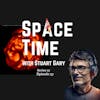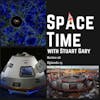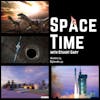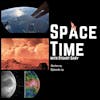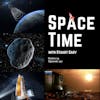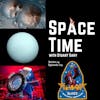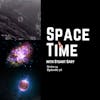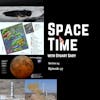89: Monster planet discovery rewrites the text books

Stream episodes on demand from www.bitesz.comspacetime (mobile friendly).
*Monster planet discovery rewrites the text books Astronomers have discovered a large Jupiter sized planet orbiting around a small red dwarf star. It’s the first time such a large planet has been seen orbiting such a low mass host star.
*Possible ancient ocean remnants found on Ceres Scientists have detected widespread reserves of minerals containing water on the dwarf planet Ceres. The discovery by NASA’s Dawn spacecraft suggests that the 945 kilometre wide world may have once had a global ocean and may still have liquid today.
*The Rochechouart Astrobleme Geologists have begun an intense core drilling campaign at Rochechouart in central France to study an astrobleme. The Rochechouart Astrobleme is thought to be the remains of a 20 to 30 kilometre wide 207 million year old impact crater.
*New clues to the origin of life on Earth Chemists at The Scripps Research Institute have found a compound that may have been a crucial factor in the origins of life on Earth. Origins-of-life researchers have hypothesized that a chemical reaction called phosphorylation may have been crucial for the assembly of three key ingredients in early life forms:
*Antares launches Cygnus bound for the International Space Station A Cygnus cargo ship has successfully launched aboard an Antares rocket bound for the International Space Station. The Cygnus OA-8 blasted off from Orbital’s Wallops Island launch pad on the Virginian mid-Atlantic coast on a two-day journey to the orbiting outpost. *Orbital launches Minotaur-C rocket Orbital has launched a Minotaur-C rocket from the Vandenberg Air Force Base in California carrying ten new satellites into orbit. The launch system was renamed Minotaur from its original name of Taurus following a series of spectacular launch failures which darkened the Taurus name. The Taurus XL became the Minotaur C, while the Taurus II was renamed the Antares.
*The Science Report
Eating at night associated with higher risk of heart disease and diabetes. The oldest ocean water dated to over a thousand years of age. Rare stromatolites discovered living in a remote valley deep in the Tasmanian wilderness. Alvarezsaurid dinosaur fossils discovered in Uzbekistan. Sheep found to recognize human faces. Australian skeptics take a scientific look at acupuncture.
The video for the Cygnus rocket launch is at: https://www.youtube.com/watch?v=UCZ28hyGvK0
The video for the Minotaur rocket launch is at: https://www.youtube.com/watch?v=eWsxNGD3fPE
For enhanced Show Notes including photos to accompany this episode, visit: http://www.bitesz.com/spacetimeshownotes
Subscribe, rate and review SpaceTime at all good podcasting apps…including iTunes, Google Podcasts, Stitcher, Pocketcasts, Podbean, Radio Public, Tunein Radio, google play, etc
Help support SpaceTime : The SpaceTime with Stuart Gary merchandise shop. Get your T-Shirts, Coffee Cups, badges, tote bag + more and help support the show. Check out the range: http://www.cafepress.com/spacetime Thank you.
Plus: As a part of the SpaceTime family, you can get a free audio book of your choice, plus 30 days free access from audible.com. Just visit www.audibletrial.com/spacetime or click on the banner link at www.spacetimewithstuartgary.com
Email: SpaceTime@bitesz.com
Join our mailing list at http://www.bitesz.com/join-our-mailing-list
Learn more about your ad choices. Visit megaphone.fm/adchoices
Support this show http://supporter.acast.com/spacetime.
See acast.com/privacy for privacy and opt-out information.
The Astronomy, Space, Technology & Science News Podcast.
New to SpaceTime with Stuart Gary?
Here are some great episodes to start with.







































